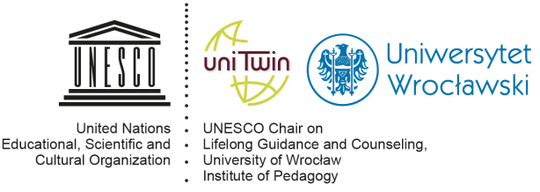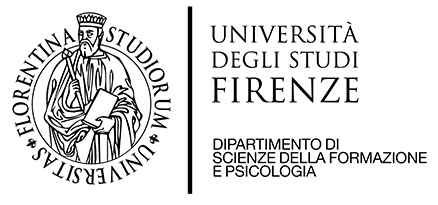UNESCO Chair on Lifelong Guidance and Counseling Conference in Florence 2015
09.03.2015


June 4 - 6, 2015
We have the pleasure of inviting you to participate in the International Conference which will take place on June 4-6th in Florence (Italy) organized jointly by UNESCO Chair on Lifelong Guidance and Counseling (Institut of Pedagogy, University of Wroc?aw) and University of Florence (Department of Education and Psychology).
“How can career and life designing interventions contribute to a fair and sustainable development and to the implementation of decent work over the world?”
TOPIC
Early in the 20th century, when social workers and theoreticians formed the profession of vocational guidance, they debated the ultimate purpose of guidance or its “finality.” Of course they all agreed that the proximate goal was to help people find matching occupations or professions. But: what of the ultimate goal? Some professionals thought the ultimate goal was to contribute to the efficiency of an industrial economy. Nevertheless, most commentators concluded that the ultimate goal of vocational guidance was to contribute to the Progressive Movement in building societies that were both wealthier and more socially fair, not just efficient.
Vocational guidance has evolved during the 20th century in connection with the transformation of the work organizations and of the scientific approaches to human subjects. It now supports individuals who – as they work in flexible organizations and live in increasingly liquid societies – must think about designing their work paths and lives rather than just matching people to work functions or positions. But has its ultimate goal remained true to its Progressive goal? It is now critical that the profession revisits and further articulates the ultimate goal of career counselling. Do career interventions still pursue the finality of improving the common good of humanity? If so, how can career and life designing interventions contribute to the development of decent work in a sustainable and fair world economy? If the ultimate goal of life and career designing remains true to its roots, we must reaffirm its importance and advocate for its social value.
ORGANIZATION
Several workshops will be held in parallel. Participants in these workshops will have three occasions throughout the conference to work together on one of the following topics:
A. “Training for practitioners, implement research and build up tools for a fair and sustainable human development”;
B. “Training for practitioners, implement research and build up tools to develop decent work all over the world”.
A moderator leads each workshop that includes also a reporter. The latter presents a summary of the works in the final session of the conference.
During these workshops, some participants may provide some short presentations contributing to the debate of the group.
President of the UNESCO Chair Conference in Florence 2015: Jean Guichard (Head of the UNESCO CHAIR University of Wroclaw, Poland & CNAM, Paris, France) and Annamaria Di Fabio (University of Florence, Italy)
Scientific Committee: Gabriela Aisenson (University of Buenos-Aires, Argentina), Jean-Luc Bernaud (INETOP-CNAM, France), David Blustein (Lynch School, Boston College, USA), Valérie Cohen-Scali (Conservatoire National des Arts et Métiers, Paris, France), Jean Pierre Dauwalder (University of Lausanne, Switzerland), Christine Delory-Momberger (University Paris 13 Sorbonne Paris Cité, France), Annamaria Di Fabio (University of Florence, Italy), Violetta Drabik-Podgórna (Insitute of Pedagogy, University of Wroclaw, Poland), Maria Eduarda Duarte (Faculty of Psychology, University of Lisbon, Portugal), Geneviève Fournier (Centre de recherche et d’intervention sur l’éducation et la vie au travail – CRIEVAT, Université Laval, Québec, Canada), Paul Hartung (Northeast Ohio Medical University, USA), Christian Heslon (Catholic University of the West, Angers, France), Maureen Kenny (Dean of Lynch School, Boston College, USA), Jacobus Gideon (Kobus) Maree (University of Pretoria, South Africa), Mary McMahon (The University of Queensland, Australia), Issa Moumoula (University of Koudougou, Burkina Faso), Marek Podgórny (Institute of Pedagogy, University of Wroclaw, Poland), Jacques Pouyaud (University of Bordeaux, France), Marcelo Ribeiro (University of San Paulo, Brazil), Mary Sue Richardson (New York University, USA), Jérôme Rossier (Institute of Psychology, University of Lausanne, Switzerland), Mark Savickas (Northeastern Ohio Medical University, USA), Guðbjörg Vilhjálmsdóttir (University of Iceland, Iceland), Richard Young (University of British Columbia, USA).
Presidents of the Organizing Committee: Annamaria Di Fabio (University of Florence, Italy) and Violetta Drabik-Podgórna (Insitute of Pedagogy, University of Wroclaw, Poland).
Organizing Committee: Ornella Bucci (University of Florence, Italy), Valérie Cohen-Scali (Conservatoire National des Arts et Métiers, Paris, France), Jean Pierre Dauwalder (University of Lausanne, Switzerland), Violetta Drabik-Podgórna (Institute of Pedagogy, University of Wroclaw, Poland), Paolo Federighi (University of Florence, Italy), Giovanni Marocci (University of Florence, Italy), Letizia Palazzeschi (University of Florence, Italy), Marek Podgórny (Institute of Pedagogy, University of Wroclaw, Poland), Jacques Pouyaud (University of Bordeaux, France).
To register contact us: Annamaria Di Fabio (University of Florence, Italy) Email: adifabio@psico.unifi.it
Provisional program
Registration form

